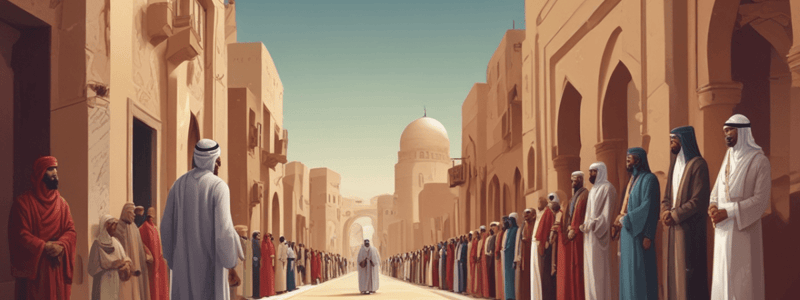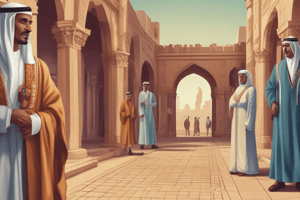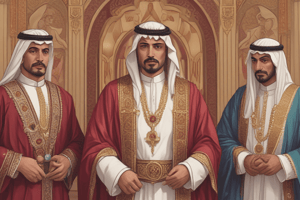Podcast
Questions and Answers
When did Qatar start to engage in Arab affairs for the first time?
When did Qatar start to engage in Arab affairs for the first time?
- 1935
- 1949
- 1956 (correct)
- 1916
What was the mission of the British political agent in Qatar?
What was the mission of the British political agent in Qatar?
- To oversee internal affairs in Qatar
- To implement treaties signed with other countries
- To manage Qatar's foreign affairs (correct)
- To look after the businesses of Indian nationals in Qatar
What was the result of the growing British influence in Qatar?
What was the result of the growing British influence in Qatar?
- Qatar gained full independence from Britain
- The British influence remained the same
- Qatar's connection with Britain intensified (correct)
- Qatar became less connected to Britain
What did Sheikh Ali agree to implement in 1949?
What did Sheikh Ali agree to implement in 1949?
What was a concern for Qatari citizens?
What was a concern for Qatari citizens?
What was a significant improvement in Qatar?
What was a significant improvement in Qatar?
Who was appointed as Britain's first political agent in Qatar in 1949?
Who was appointed as Britain's first political agent in Qatar in 1949?
What was the role of Philip Plant in Qatar?
What was the role of Philip Plant in Qatar?
What was the structure of Qatar's government before Sheikh Ali bin Abdullah?
What was the structure of Qatar's government before Sheikh Ali bin Abdullah?
What did the Sheikh rely on to make decisions in the absence of written laws?
What did the Sheikh rely on to make decisions in the absence of written laws?
Who did the Sheikh consult with in some public matters?
Who did the Sheikh consult with in some public matters?
What was the significance of the year 1950 in Qatar's history?
What was the significance of the year 1950 in Qatar's history?
How did the Sheikh exercise his judicial powers?
How did the Sheikh exercise his judicial powers?
What was the primary criterion for naming a crown prince?
What was the primary criterion for naming a crown prince?
What was the main source of income before the oil era?
What was the main source of income before the oil era?
What was the reason for Britain's pressure on Sheikh Ali bin Abdullah to implement administrative reforms?
What was the reason for Britain's pressure on Sheikh Ali bin Abdullah to implement administrative reforms?
What was the result of the oil era beginning in 1949?
What was the result of the oil era beginning in 1949?
What was the role of the crown prince in the administration?
What was the role of the crown prince in the administration?
What was the result of the small population in Qatar and the need for manpower?
What was the result of the small population in Qatar and the need for manpower?
What was developed to meet the large demand for water?
What was developed to meet the large demand for water?
What was Hancock particularly attentive to?
What was Hancock particularly attentive to?
What was built in Doha in 1957?
What was built in Doha in 1957?
What was the nationality of the administration that emerged in the 1950s?
What was the nationality of the administration that emerged in the 1950s?
What was built to receive large ships and handle more loading and unloading operations?
What was built to receive large ships and handle more loading and unloading operations?
Who failed to draft a state budget in Qatar?
Who failed to draft a state budget in Qatar?
What was the title awarded to Sheikh Ali by the Queen of England?
What was the title awarded to Sheikh Ali by the Queen of England?
In what year was Qatar's first budget set by Hancock?
In what year was Qatar's first budget set by Hancock?
What was the name of the bank that set up a branch in Doha in 1949?
What was the name of the bank that set up a branch in Doha in 1949?
Who was appointed as a financial advisor to replace Philip Plant?
Who was appointed as a financial advisor to replace Philip Plant?
Why were talks held with British operators of mail, telephone and telegraph services?
Why were talks held with British operators of mail, telephone and telegraph services?
The British convinced Sheikh Ali bin Abdullah to bring foreign workers to Qatar due to the large population.
The British convinced Sheikh Ali bin Abdullah to bring foreign workers to Qatar due to the large population.
A modern police force was established in Qatar before the drafting of a budget.
A modern police force was established in Qatar before the drafting of a budget.
Qatar's government before Sheikh Ali bin Abdullah was more British than Qatari.
Qatar's government before Sheikh Ali bin Abdullah was more British than Qatari.
A fish, meat, and produce market was constructed in Rumaila.
A fish, meat, and produce market was constructed in Rumaila.
The construction of a new port and docks in Doha was to handle small ships and limited loading and unloading operations.
The construction of a new port and docks in Doha was to handle small ships and limited loading and unloading operations.
The first seawater desalination plant in Qatar was built in 1957.
The first seawater desalination plant in Qatar was built in 1957.
The Sheikh initially encouraged expanding the police force.
The Sheikh initially encouraged expanding the police force.
The Al Fadawiya force was used as a combat force and to maintain security and guard the Sheikh's person.
The Al Fadawiya force was used as a combat force and to maintain security and guard the Sheikh's person.
Labor strikes in the oil sector led to the expansion of the police force in Qatar.
Labor strikes in the oil sector led to the expansion of the police force in Qatar.
The British had no influence on Qatar's security before the establishment of the police force.
The British had no influence on Qatar's security before the establishment of the police force.
Shell oil company operated in Qatar without paying concession fees.
Shell oil company operated in Qatar without paying concession fees.
The Al Fadawiya force consisted of over 1,000 men.
The Al Fadawiya force consisted of over 1,000 men.
Labor strikes were a common occurrence in Qatar during the 1950s.
Labor strikes were a common occurrence in Qatar during the 1950s.
Oil exploration began in Qatar in 1949.
Oil exploration began in Qatar in 1949.
A modern police force was established in Qatar during the 1950s.
A modern police force was established in Qatar during the 1950s.
Britain had no influence on Qatar's security during the 1950s.
Britain had no influence on Qatar's security during the 1950s.
Qataris were not integrated into the workforce during the 1950s.
Qataris were not integrated into the workforce during the 1950s.
Britain had no presence in Qatar before 1949.
Britain had no presence in Qatar before 1949.
Flashcards
Suez Canal Nationalization
Suez Canal Nationalization
Qatar's first involvement in Arab affairs, demonstrating public support for Egypt in 1956.
Palestinian Cause
Palestinian Cause
Qatari population started showing increasing concern for Palestinian issue in the 1950s, highlighting growing solidarity within the Arab world.
Traditional Emirate to Modern State
Traditional Emirate to Modern State
Qatar experienced a transition from a traditional emirate to a modern state, marked by improvements in citizen services.
British Political Agent
British Political Agent
Signup and view all the flashcards
Sheikh Ali bin Abdullah
Sheikh Ali bin Abdullah
Signup and view all the flashcards
British Influence in Qatar
British Influence in Qatar
Signup and view all the flashcards
Modern Administration
Modern Administration
Signup and view all the flashcards
Philip Plant and Hancock
Philip Plant and Hancock
Signup and view all the flashcards
Qatar's First Budget
Qatar's First Budget
Signup and view all the flashcards
Corniche
Corniche
Signup and view all the flashcards
Seawater Desalination Plant
Seawater Desalination Plant
Signup and view all the flashcards
Healthcare Facilities
Healthcare Facilities
Signup and view all the flashcards
Educational Institutions
Educational Institutions
Signup and view all the flashcards
Marketplace Expansion
Marketplace Expansion
Signup and view all the flashcards
Police Force Establishment
Police Force Establishment
Signup and view all the flashcards
Centralized Governance
Centralized Governance
Signup and view all the flashcards
Pre-Oil Revenue Sources
Pre-Oil Revenue Sources
Signup and view all the flashcards
Oil Discovery Impact
Oil Discovery Impact
Signup and view all the flashcards
Labor Strikes
Labor Strikes
Signup and view all the flashcards
Tribal Guards
Tribal Guards
Signup and view all the flashcards
Population Growth
Population Growth
Signup and view all the flashcards
Foreign Worker Influx
Foreign Worker Influx
Signup and view all the flashcards
Pre-Oil Financial Landscape
Pre-Oil Financial Landscape
Signup and view all the flashcards
Oil Revenue Dominance
Oil Revenue Dominance
Signup and view all the flashcards
Modern Local Governance
Modern Local Governance
Signup and view all the flashcards
Police Force Role
Police Force Role
Signup and view all the flashcards
Study Notes
Historical Engagement in Arab Affairs
- Qatar first engaged in Arab affairs during the Suez Canal nationalization in 1956, demonstrating public support for Egypt.
- The Qatari population showed increasing concern for the Palestinian cause, highlighting growing Arab solidarity.
- Transitioned from a traditional emirate to a modern state during this period, with significant improvements in citizen services.
British Influence (1949-1960)
- British political influence intensified after appointing a political agent in Qatar in 1949, marking a shift from reliance on Bahrain for overseeing British interests.
- The role of the British political agent included managing foreign affairs, representing British interests, and undertaking judicial tasks for foreign nationals.
- Following Sheikh Abdullah’s abdication, Sheikh Ali bin Abdullah reaffirmed commitments to British treaties established between 1916 and 1935.
Administrative Evolution
- Sheikh Ali bin Abdullah was pivotal in establishing modern administration, including appointing British advisors for governance and public services.
- British officials like Philip Plant and later Hancock played critical roles in forming administrative structures and financial regulations.
- Introduction of Qatar’s first budget in 1953 under Hancock, leading to modernization in financial practices and infrastructure development.
Infrastructure Development
- Significant service projects included a modern Corniche in Doha, new ports, a seawater desalination plant, and healthcare facilities such as a new hospital in Rumaila (opened 1957).
- Established educational institutions and marketplaces, fostering better living conditions and economic activity.
- The establishment of a police force became necessary due to labor unrest and the need for maintaining law and order.
Governance Structure Pre-Sheikh Ali
- Governance was traditionally centralized under the Sheikh without written laws, relying on customs and traditions; the Sheikh held all powers—legislative, executive, and judicial.
- Discussions among tribal elders and scholars were informal, lacking structured governance frameworks, until the shift towards modern administration.
Financial Landscape Pre-Oil Era
- Pre-oil revenues were primarily derived from taxation on maritime industries and customs duties.
- The discovery of oil in 1949 transformed Qatar's economy, with oil revenues becoming the major financial source, leading to calls for modern local governance by British authorities.
Establishment of Police and Law Enforcement
- Formation of a local police force was crucial for maintaining stability, notably after labor strikes in the early 1950s demonstrated the need for improved security measures.
- The Sheikh initially relied on tribal guards but adapted by expanding the police force to address emerging social unrest and protect foreign investment.
Socioeconomic Improvements
- Population growth accompanied improvements in health and education services, contributing to the overall modernization of the state.
- British involvement facilitated the influx of foreign workers, essential for Qatar's development amidst a small native population.
Studying That Suits You
Use AI to generate personalized quizzes and flashcards to suit your learning preferences.
Related Documents
Description
Qatar's involvement in Arab affairs, nationalization of the Suez Canal, and transformation into a modern state. Improvement of services, population growth, and health and education services.




